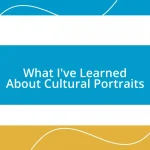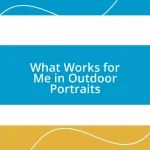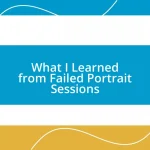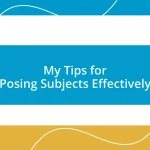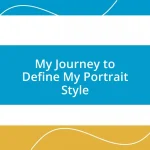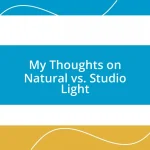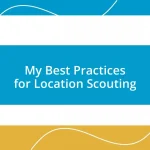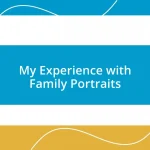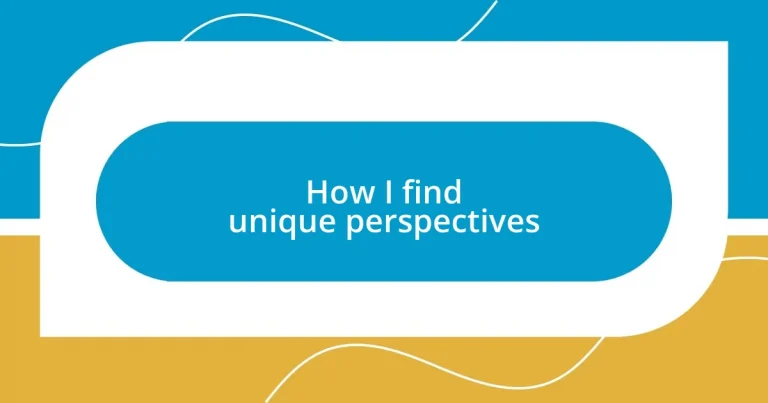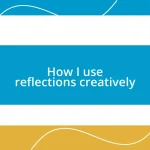Key takeaways:
- Engaging with diverse perspectives fosters empathy and enriches our understanding of others’ experiences.
- Active listening can lead to deeper insights and create stronger connections in conversations.
- Asking thought-provoking questions transforms dialogue and encourages exploration of complex ideas.
- Reflecting on insights, even in quiet moments, can uncover clarity and enhance creative thinking.
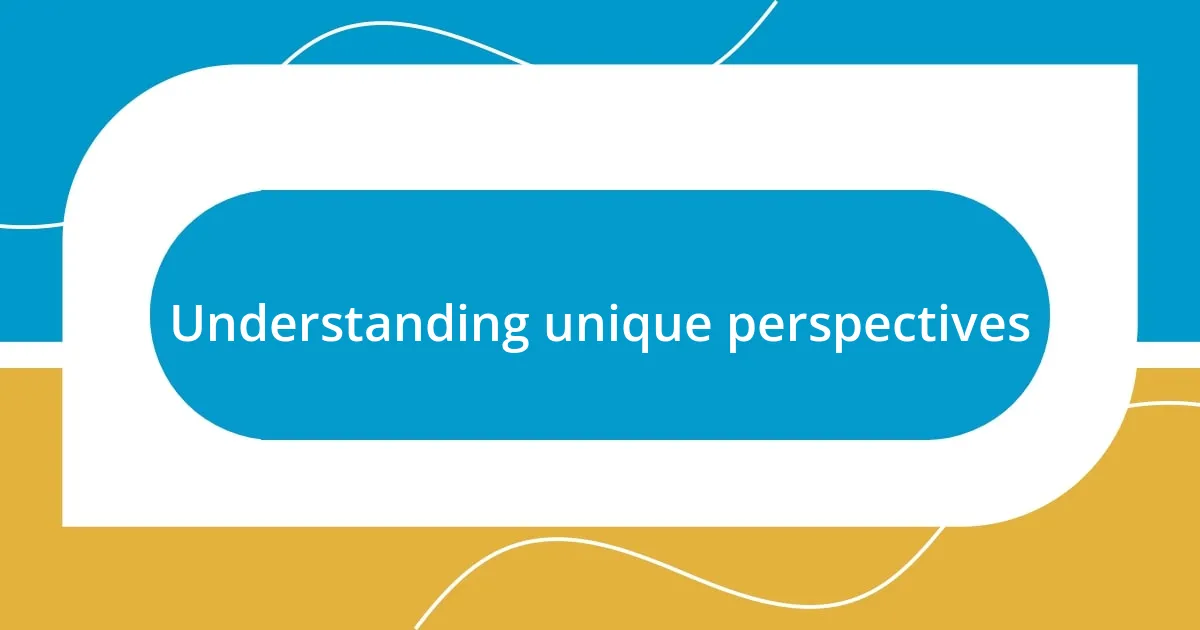
Understanding unique perspectives
Understanding unique perspectives requires an openness to the world around us. I remember a time when I attended a cultural festival. Engaging with people from different backgrounds opened my eyes to ways of thinking and living that I had never considered. Isn’t it fascinating how a simple conversation can reshape our understanding of reality?
When I reflect on my experiences, I often think about how my own biases colored my view of others. I once assumed that a colleague’s quiet demeanor meant she wasn’t interested in contributing, but when I took the time to ask for her thoughts, she shared insights that completely shifted the project’s direction. How often do we miss out on valuable contributions simply because we don’t seek out the stories behind the silence?
Embracing diverse viewpoints can foster richer connections and understanding. Each person carries a unique history, and those narratives can illuminate aspects of life we might overlook. Have you ever listened to someone’s story and thought, “Wow, I never saw it that way”? In moments like these, we realize the power of perspective, and it can be truly transformative.
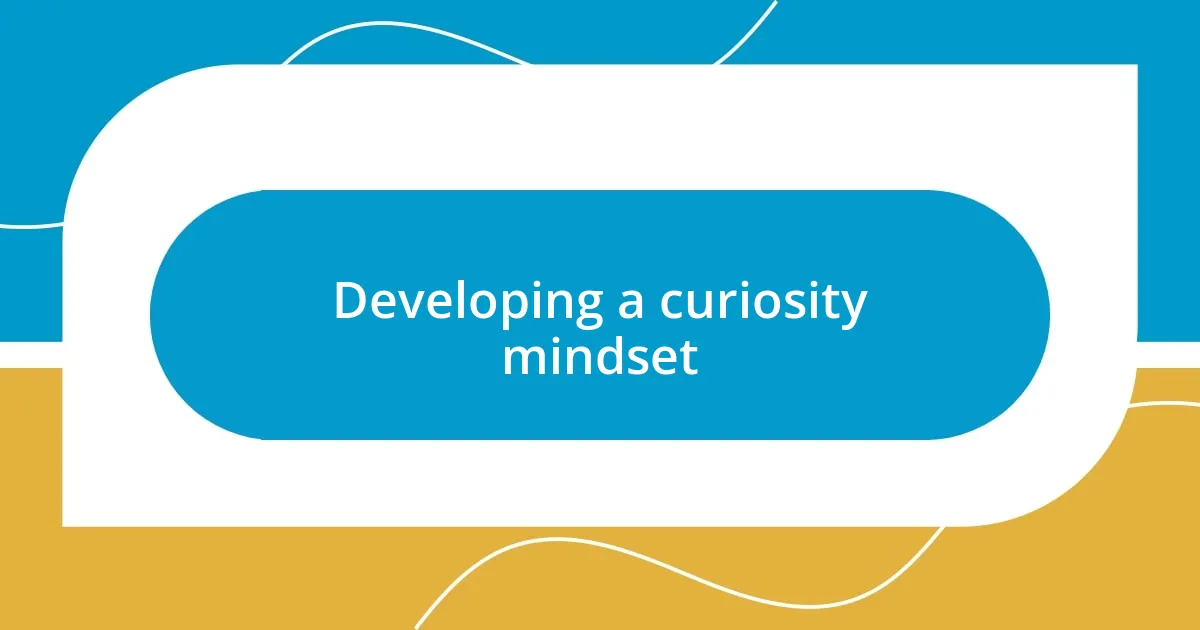
Developing a curiosity mindset
Developing a curiosity mindset opens up a world of possibilities. I once navigated a nature hike, where every new sight—the intricate patterns of leaves or the sounds of birds—sparked my questions. “What plant is this?” or “Why do those birds sing like that?” It was almost exhilarating to let curiosity lead my thoughts, transforming a simple outdoor walk into an adventure of discovery.
To nurture your curiosity, consider these approaches:
- Ask open-ended questions: Instead of yes or no, challenge yourself to think deeper.
- Explore new environments: Visit unfamiliar places, even in your own city, where you can encounter fresh perspectives.
- Engage with various mediums: Read books or watch documentaries outside your usual interests to expand your knowledge.
- Reflect on your daily experiences: Keep a journal to document moments of wonder and insights that pop up during your day.
- Connect with curious people: Surround yourself with those who inspire inquiry and enthusiasm for learning.
I find that these practices breathe life into my understanding and spark new ideas, sometimes leading to unexpected insights that shape my thinking.
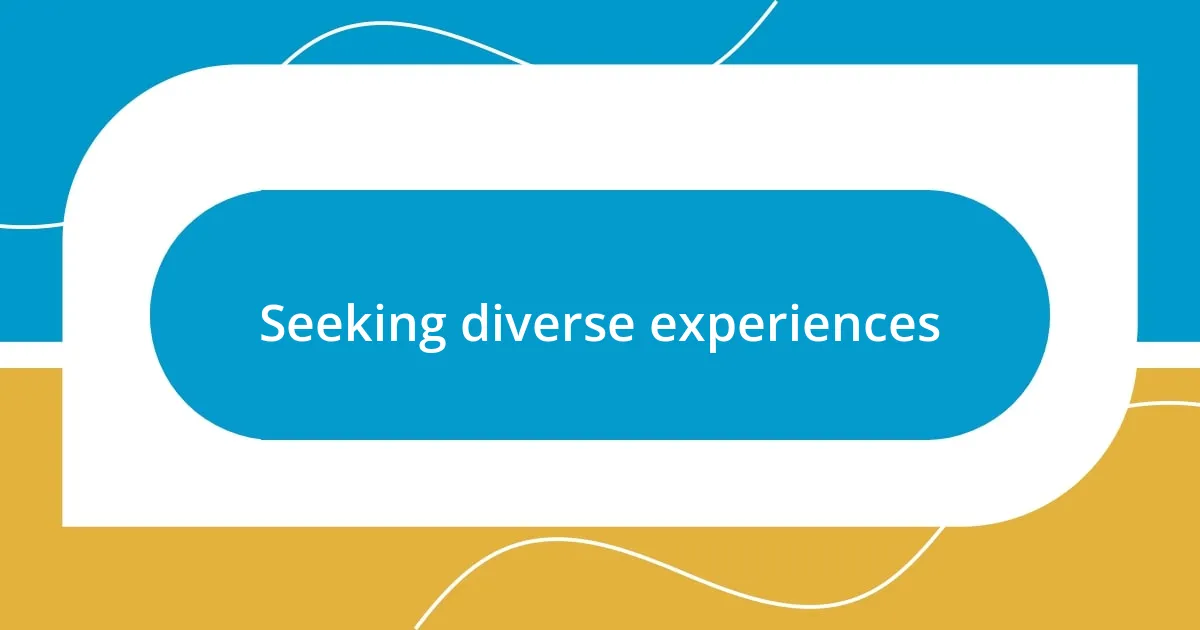
Seeking diverse experiences
Engaging with diverse experiences has been incredibly enriching for me. For example, when I traveled to a small village in a different country, I had the chance to stay with a local family. Their customs, like the vibrant communal meals filled with laughter and storytelling, reminded me that community can take many forms. This experience made me realize how much we can learn about ourselves when we immerse ourselves in someone else’s world.
I’ve also found that hobbies can introduce us to unique perspectives. During my journey into pottery, I met artists from various backgrounds, each bringing their own techniques and philosophies to the craft. One of them taught me about the meditative process of creating art, which profoundly changed my approach not just to pottery but to life itself. Have you ever engaged in a hobby that opened your eyes to a new way of thinking?
Exploring new avenues, whether through travel or hobbies, can reshape our perceptions of normalcy. I remember attending a poetry reading that featured voices from underrepresented communities. Each poem expressed experiences that were often at odds with my own understanding, challenging my assumptions and broadening my empathy. Such moments underscore the value of seeking out diverse experiences—they not only deepen our understanding but also enrich our emotional lives.
| Type of Experience | Potential Insights |
|---|---|
| Cultural Exchange | Broadens worldview, increases empathy |
| Hobbies and Crafts | Enhances creativity, introduces new techniques |
| Community Engagement | Strengthens social connections, fosters understanding |
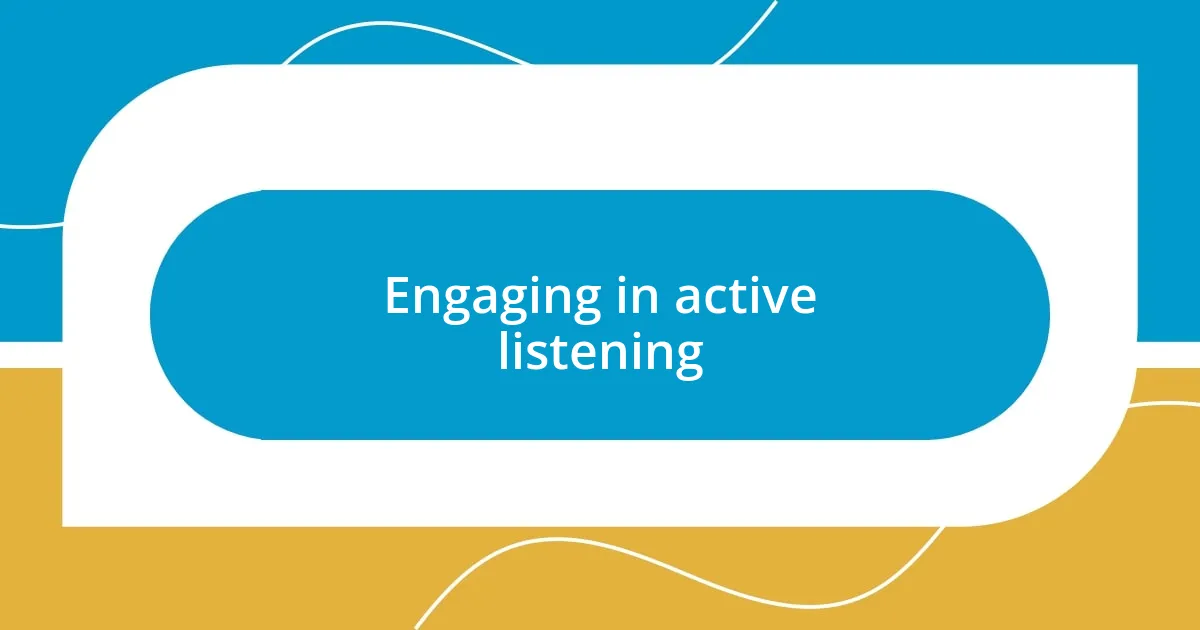
Engaging in active listening
Engaging in active listening is a skill that often feels overlooked. I remember a conversation I had with a friend who was facing a tough choice. Instead of jumping in with my advice, I simply listened, allowing them to express their thoughts fully. By giving them space, I saw how their perspective shifted as they spoke, almost like they were uncovering their own answers. Have you ever noticed how people can clarify their thoughts simply by sharing them aloud?
One technique I’ve found valuable is to reflect back what I hear. For instance, during team meetings, I often paraphrase my colleagues’ points to confirm I understood them correctly. This practice not only shows that I’m present but also fosters deeper discussions. When people feel heard, they’re more likely to open up and share insights that can surprise even them.
I also practice the art of listening with my heart, allowing emotions to guide the conversation. When my niece was upset about her school project, I dropped everything and chose to sit with her in silence initially. It was powerful to witness her release tension as she felt my genuine presence. This taught me that sometimes, the strongest connections come from simply being there, fully engaged, and actively listening. Isn’t it fascinating how truly hearing someone can lead to richer insights and understanding?
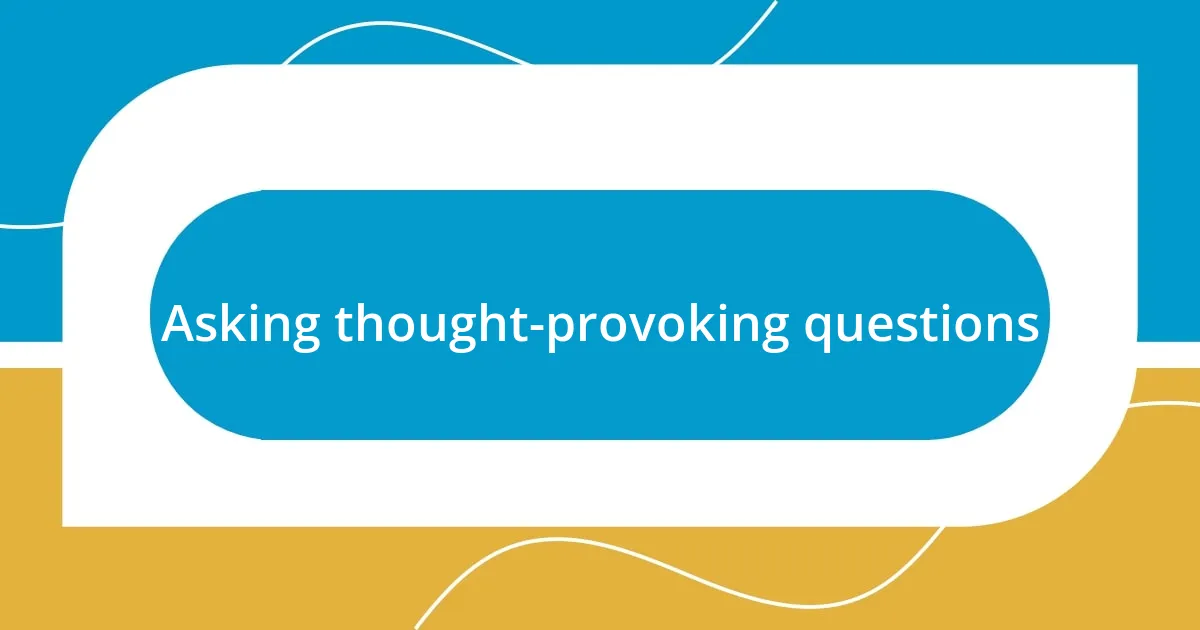
Asking thought-provoking questions
Asking thought-provoking questions is a practice I treasure. There was a time when I attended a philosophy discussion group, where we tackled complex issues. One of the questions posed was, “What does it mean to live a good life?” This simple yet profound inquiry sparked a dialogue that made us all reflect on our values and beliefs. I left that session feeling invigorated and challenged in the best possible way. Have you ever found yourself contemplating something deeply after a single question?
One strategy I use is to reframe common queries into more compelling ones. Instead of asking, “What did you think of the movie?” I might ask, “How did the film change your perspective on friendship?” This shift invites richer conversations and often uncovers emotions that linger beneath the surface. I’ve experienced moments where a single question led to a deeper understanding of both the film and my companion’s experiences, strengthening our bond. Isn’t it interesting how a well-crafted question can lead to such insights?
I’ve also discovered that the art of questioning isn’t just about seeking answers; it’s about creating a safe space for exploration. During a community workshop, I encouraged participants to ask each other questions outside the usual small talk. The atmosphere shifted, and I watched as their faces lit up with curiosity and excitement. It was astonishing to see how a simple question could unlock layers of complexity and emotion. Have you ever witnessed the magic that happens when someone dares to ask something unexpected?
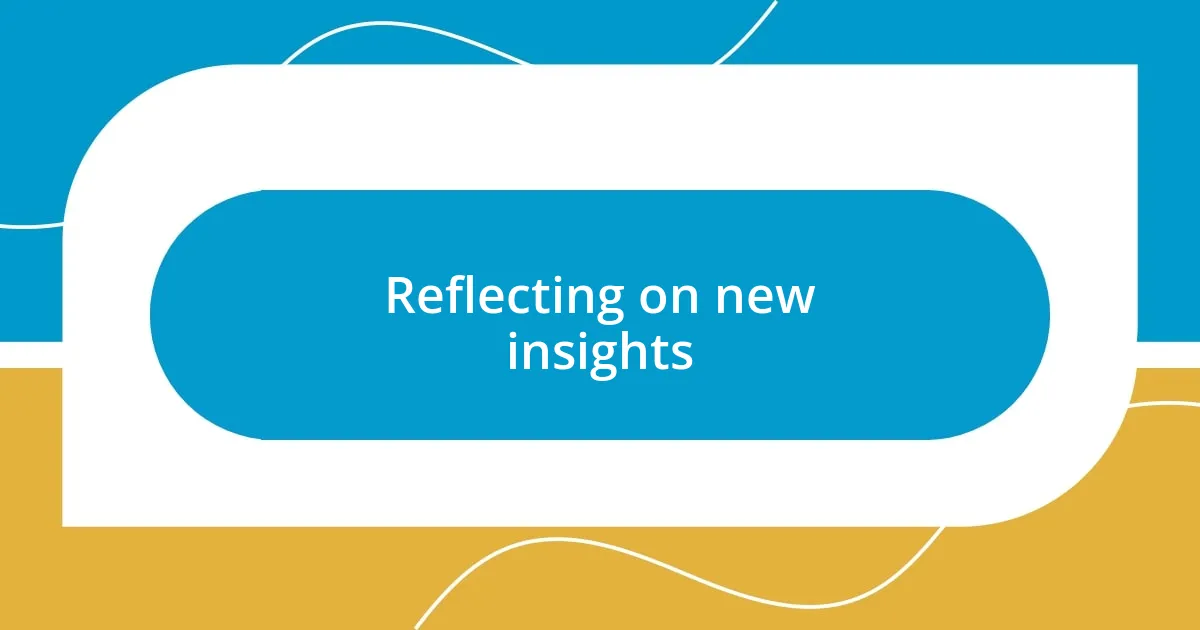
Reflecting on new insights
Reflecting on new insights can be both thrilling and daunting. Recently, I took a moment to sit quietly with my thoughts after attending a workshop on creativity. As I absorbed the information, I realized that my perspective on brainstorming had completely shifted. Instead of seeing it as a race to generate ideas, I began to view it as an intentional, slow process of exploration. Isn’t it intriguing how giving ourselves space to ponder can uncover layers we never knew existed?
One memorable instance of reflection happened during a nature walk with a close friend. As we walked, we shared our recent struggles, and I found myself quietly contemplating how nature’s cycles mirrored our challenges. It dawned on me that just like the seasons change, so do our personal trials and triumphs. This connection not only provided clarity but also a sense of comfort – realizing that change is a universal experience. Have you ever felt grounded by something as simple as a walk in nature?
What strikes me most about reflecting on insights is the thought that these moments don’t always appear grand or pivotal. I recall sitting at a café, sipping my coffee, when an idea hit me about a project I had been struggling with. It was in that serene moment of solitude, away from distractions, that my mind finally connected the dots. I understood then that taking time to reflect is essential. How often do we overlook our quiet moments, which can be the very catalysts for clarity and creativity?
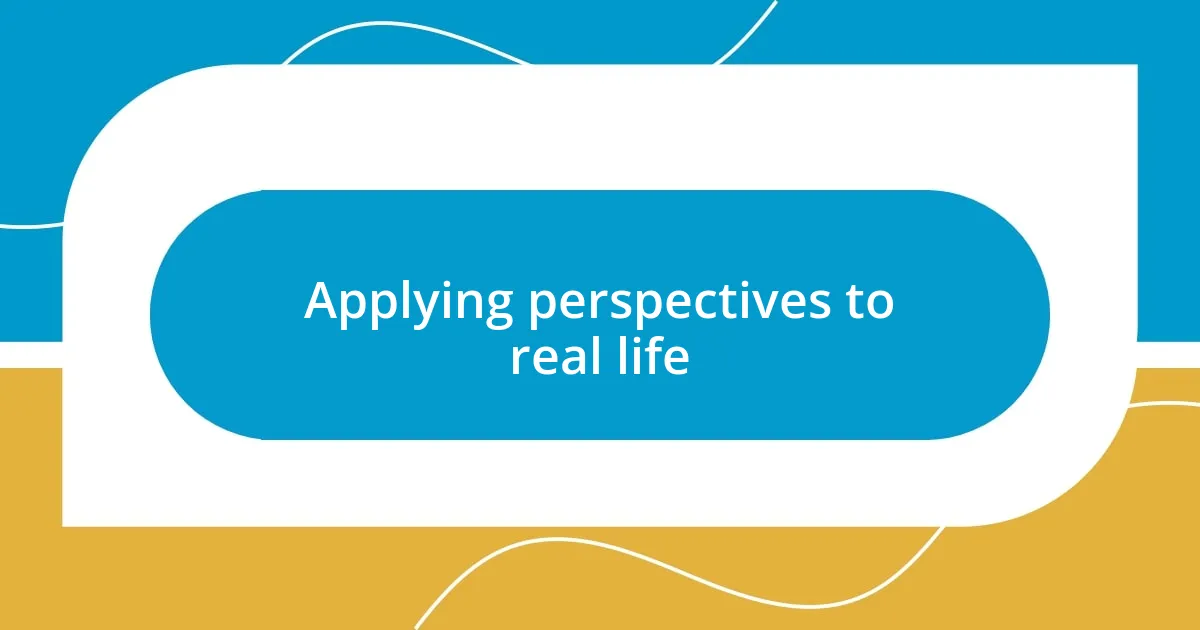
Applying perspectives to real life
Applying perspectives in real life isn’t just an abstract concept; it can lead to tangible changes in how we interact with others. I remember a heated debate I had with a coworker about a project direction. Instead of insisting on my viewpoint, I took a step back and asked her to explain her vision in detail. This shift changed the entire conversation, allowing us to collaborate more effectively. Have you ever noticed how genuinely listening to another’s perspective can transform conflict into a shared goal?
I’ve found that nuances matter in how perspectives are applied. For instance, while volunteering at a local shelter, I listened to stories from residents that entirely reshaped my understanding of homelessness. Their experiences were filled with resilience and hope, contrasting sharply with stereotypes I had previously held. This eye-opening encounter ignited a passion within me to advocate for better representation in community discussions. How often do we let preconceived notions cloud our ability to see the richness of someone else’s story?
One practical way I integrate unique perspectives into my daily life is through diverse reading. I dedicated a month to exploring literature from authors around the globe. Some of those narratives shook me to my core, altering my views on everything from cultural identities to personal struggles. It’s amazing how stepping into someone else’s shoes—even if just through a book—can lead to profound personal growth. Have you ever been surprised by how a voice from a different background resonated with your own experiences?
